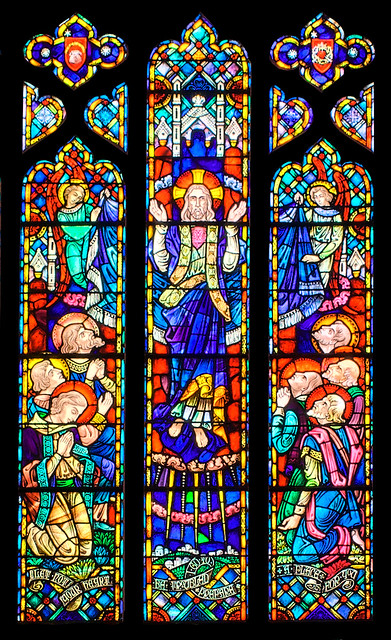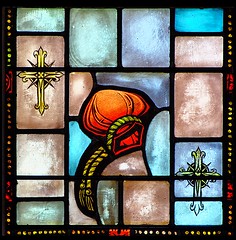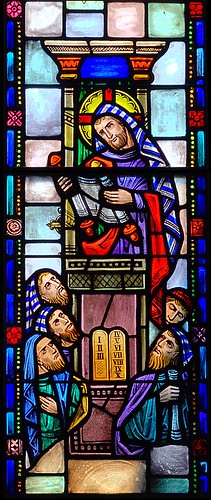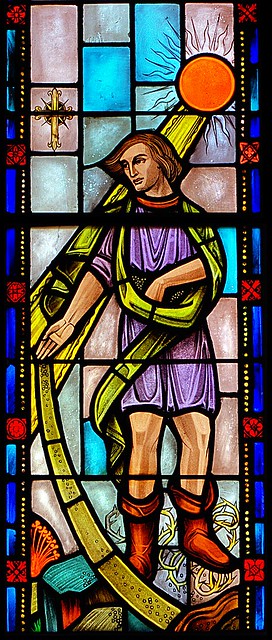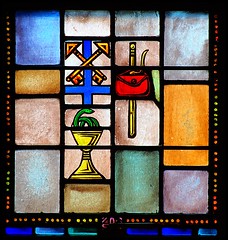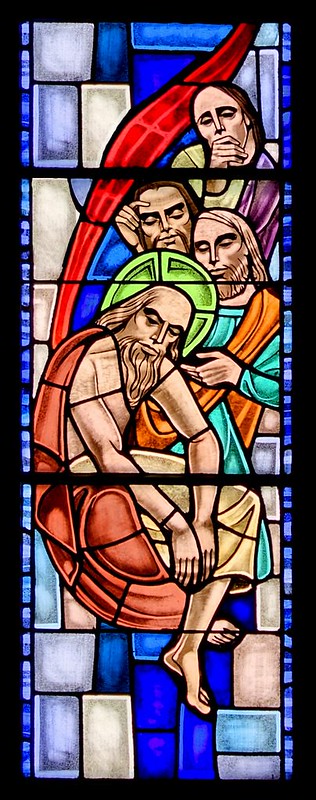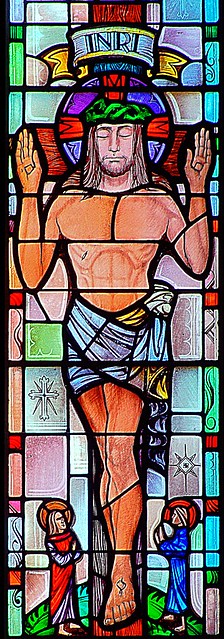by Pastor Paul Wolff
Darwinists, or those
who see macro-evolution as a viable theory, have always had a strange
fascination with primitive cultures. Since they believe that people
have evolved over time, and advanced from lower, inferior beings and
creatures, they think that all civilized people advanced from a
primitive state to a sophisticated, evolved, civilized state. This
makes a somewhat (though not completely) plausible and compelling
story. People want to believe this story because it makes us look
better than the primitives (both ancient and contemporary). “We are
the more advanced people. We have evolved. We are better, and are
only getting better.” One major problem with this is that it views
the primitive peoples as inferior, and lesser, and even less human,
which quickly leads to racism and hatred. If some person is inferior,
then they can be treated as of less worth than those who are seen as
superior, and “less worth” is quickly seen as “worthless” and
those people are soon viewed as less than human. And if some people
are less human, then they can be exploited and enslaved, and
sometimes killed at will. This has all happened in the past two
centuries, as I will show below, but this is not the only problem
with the evolutionary view.
The Darwinist view
is completely backward.
 |
Civilization began on the Sixth Day of Creation
with the creation of Adam and Eve
|
There is another way
to look at primitive cultures which is, perhaps, not quite as
compelling to people who want to see themselves as “evolved” and
“advanced” and better than other people, but it has the
advantages of having better historical evidence, and better fitting
the facts we see in people who live in primitive cultures. The
Christian view tells us that we all descend from the first two people
God made, Adam and Eve. When God made Adam and Eve He made them in
His image. They were fully formed adults (husband and wife) from
their first breath, and perfect in body and soul. They not only were
given language skills and understanding on the day they were made
(Day Six of creation), but their intellectual capabilities were
untainted by sin and guilt until they rebelled against God by
disobeying His simple, clear command. Adam and Eve were also created
to be immortal. As long as they did not disobey God they would not
have diminished in their health and strength nor “grown old” as
we understand it, nor would they have died from illness or injury.
This also suggests the reason why the first generations of people in
the antediluvian (“pre-flood”) period lived such long lives. Many
are described as having lived hundreds of years, as the effects of
sin only began to accumulate as the generations went by and took hold
in people to limit their maximum life spans.
Adam and Eve were
civilized people from the beginning. They were husband and wife, and
formed a family unit from their creation. Adam was the head, and Eve
was the helper, and together they were a family. This is the basis
for civilization. They were curious about the world around them and
wanted to learn all they could about God’s wonderful creation. Even
after the fall into sin, the Scriptures show that although the
murderer, Cain, was destined to be “a restless wanderer on the
earth” (Genesis 4:12), yet, he built a city for his son. Cain’s
descendants also raised livestock, developed musical instruments, and
learned to forge tools of bronze and iron, all within about six
generations (see Genesis 4:17-22). After that, the descendants of
Cain seemed to descend into violence and murder. (See Genesis 4:23
and 6:1-13) So already here we see civilized people becoming
uncivilized. The Canites also seduced the descendants of Seth
(Genesis 6:2) into their sinful depravity, and the whole world became
so violent and evil that God was determined to destroy them all,
except that He spared Noah and his family to keep the promise He had
made to Adam and Eve to send a savior.
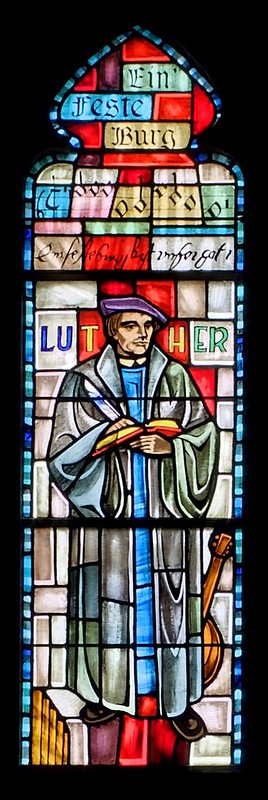 |
Brilliant thinkers like Martin Luther
Come from a well educated civilized society.
|
The history that the
Bible gives shows that civilization comes first, and then, as the
people fall into idolatry and rebel against God, they become more
violent and less civilized. We can also see this in the study of
modern primitive peoples, if we view the evidence with an open mind.
Primitivism is a dead end. You don’t get great civilizations rising
out of primitive cultures. You get primitive cultures out of great
civilizations that have been destroyed by war or disease or famine
and infected with idolatry and violence. Remember that the European
“Dark Ages” followed the fall of the Roman empire. You don’t
get great thinkers like Plato, Euclid, or Aristotle, and those like
them, from primitive cultures, even though the people themselves are
genetically just as capable of producing intellectual and artistic
brilliance as any other people. The problem isn’t that the people
are inferior, but the social structures that have been put in place
discourage the development of great thinkers and the development of
greater societal structures. This discouragement is primarily in the
form of false teaching, or if that doesn’t work, then there
are stronger societal pressures to conform or be punished, and if
those don’t work, then there is always violence and murder.
Thus, primitive cultures persist for centuries without advancing to
become greater civilizations.
If you read writings
from ancient civilized peoples you will see that, though they have
different cultures and different ways of looking at things, they are
in many ways just like modern people. The ancients had very similar
wants and desires as modern people. They viewed the world in similar
ways as modern people, and are very relatable to modern people. We
all can learn much by studying ancient writings. Conversely, there is
not a lot that we can learn from primitive cultures that survived
into the 20th century and beyond. Whatever wisdom those
people once had, was lost. Wisdom and learning are discouraged and
driven out of such societies, so that most of what is left is bare
subsistence for survival.
I recall hearing a
missionary to New Guinea tell of the effects of bringing the
Christian Gospel to the cannibal savages of that island. Not all the
people and tribes accepted the Gospel, but those who did were set
free from the tyranny of their false gods and the fear that their
“ancestors” would haunt them and punish them if they didn’t do
what the spiritual leaders (shamans, or witch doctor figures) told
them to do. The Christians lived better, built better homes and
better communities. They ate better and cooperated better so that
they trusted each other, and could band together for mutual support
and protection against enemies, and also for building their
communities and providing food and education for their neighbors.
Those who did not embrace the Christian teaching, but held on to the
idol worship and ancestor worship continued to live a primitive
existence, closer to animals than civilized people. The idol
worshipers weren’t animals, and they had some basic rules for
civilization, but their cultural structures prevented them from
developing a more complex and functional society as their Christian
neighbors did. The missionaries did not come to teach the people
“civilization” or “Democracy” or 19th and 20th
century technology. That would not have worked. The people were first
set free from the tyranny of their false gods, and only then were
they able to leave behind their primitive lifestyle.
The Past is
Prologue.
 |
Progress or Regress?
|
The irony of the
Darwinist fascination with primitive cultures is that although they
imagine that such a culture is where they came from, it is actually
where they are going! Look at the tactics that progressive Darwinists
use: false teaching, societal pressures to conform or be
punished, violence and murder. The result of evolutionary
thinking is not progress, but regress to primitive animalistic
barbarism. Progressivism is not progressive, but is actually
regressive. George Santayana wrote in the early 20th
Century: “Progress, far from consisting in change, depends on
retentiveness. When change is absolute there remains no being to
improve and no direction is set for possible improvement: and when
experience is not retained, as among savages, infancy is perpetual.
Those who cannot remember the past are condemned to repeat it.”
{The Life of Reason (1905-1906) Vol.1, Reason in Common Sense}
Santayana was no Christian,
but he could see that a healthy society builds on the successes of
the past, and learns from the mistakes and
the accomplishments of
history. If you forget the past, or
if your society forbids you from remembering the truth of history,
then you have to start over from scratch with
every generation, and are
likely to make the same mistakes that were also done in the past.
However if you learn from history, then you can avoid or
overcome the mistakes, and
move forward.
We saw something
like this in a developed country in the early 21st
century. When U.S. President, George W. Bush, conquered Iraq, he set
up a democratic government, but without imposing Christianity or even
establishing freedom of religion, so that those who wanted to become
Christian could openly do so. The result was that the people were
quickly re-conquered and dominated by the most violent and radical
Islamic groups, and the benefits of democracy in a free (and
Christian) country were destroyed. President Bush and his advisers
were extremely naïve in this, and it was tragic for many in Iraq.
 |
|
I
recall seeing a documentary on the sinking of the cruise ship,
Titanic, around the time of
the 100th
anniversary of its sinking (2012).
The producers documented the excessive pride of the builders who
wanted to believe that their ship was unsinkable, despite some
serious design and manufacturing flaws built into the ship. The
summary statement at the end was unintentionally full of irony when
they proclaimed, “One thing is certain, this will never happen
again.” This is ironic, because not
only did they fail
to show that the prideful attitudes that led to the design and
operational errors were removed from human thinking, but their final
statement was exactly the same prideful error that produced
the mistakes which led to the
sinking of the Titanic. It is not certain that such a thing would
never happen again. Actually, such things happen all the time when
people think too much of themselves, and their capabilities, and get
careless. It happens even more often in eras where the manufacturers
and overseers are greedy and corrupt, and take shortcuts to increase
short-term profits at the expense of safety. Such corruption was once
rare in the United States, but now in the early 21st
century it seems to be the standard way of doing business for many
large companies.
“Scientific”
Fear Mongers
We also see moves
toward primitivism in the scientific community in the global
warming/climate change/environmental movement fear mongering that has
been going on at least since I was a child in the 1970’s. This
climate fear mongering is really anti-science in the name of science.
It is anti-science because true science welcomes and encourages
challenges to theories in order to show their weaknesses so that
better, more accurate evaluations can be made and the theories can
better describe all the evidence seen in the physical world. However,
the environmental activists are actively opposing scientific inquiry
that challenges the political desires of the radical fear mongers.
They say that their premature conclusions are “settled” and that
true scientific challenges to their untested proclamations are
heretical. But there ought to be no concept of heresy in science. All
theories ought to welcome challenges based on new evidence either to
prove them correct, or to show their weaknesses so that they can be
improved. Orthodoxy and heterodoxy are concepts of religion, but now
that science has become a religion, true scientific inquiry has
become heterodox, and that will lead to tragedies like the Titanic,
and a regression as scientists are less able to conduct free studies,
but must only do “approved” work which does not challenge the
prevailing religious views of the scientific community. If you can’t
see how this leads to primitivism, then you haven’t understood what
I have written above to this point.
Science tells us
that, because of entropy, things tend to move toward a state of chaos
and disorder. Civilization works against chaos by ordering society
into a functional place in which people work together for a common
good. This is always a struggle because there are always forces which
are working to move things toward chaos. Primitive cultures are
chaotic cultures with only minimal organizational structures.
Christians know that God is an orderly God. 1 Corinthians 14:33 says,
“God is not a god of disorder, but of peace.” A
large part of God’s creative work in the seven days of creation was
ordering the chaos so that He could make a paradise for His beloved
people to live. God accomplished this and after creating man on the
sixth day evaluated all He had done and proclaimed creation “very
good.” However, man’s disobedience and rebellion corrupted God’s
creation and reintroduced chaos into our lives.
Karl Marx and
Primitivism
Karl Marx was
strongly influenced by the atheistic worldview of Charles Darwin. The
concepts of progressive evolution and “the survival of the fittest”
lead to a favorable view toward a totalitarian ruling class which
enslaves those deemed less fit. Marxist fascists must eliminate free
speech because in a free society people would never choose to be
enslaved, nor submit to those who want to enslave them. Free speech
also includes knowledge and application of history as a guide to what
is the best course of action to deal with problems in society. Those
who seek to dominate or enslave others cannot permit such inquiry, so
they feel compelled to destroy books and ideas. Santayana shows that
this leads directly to primitivism. If good, constructive ideas are
banned, then there can be no good progress, and the society either
remains stagnant, or it deteriorates.
 |
War, disease and famine can move
societies toward a primitive existence.
|
Venezuela and Cuba
were both once thriving societies, but Marxist regimes came in and
murdered the freedom-loving leaders. Many fled the country if they
were able. The revolutionaries took control of businesses and all
physical representations of wealth which was in the country, and the
people were impoverished and unable to provide income for themselves
because the businesses were controlled by the government.
Totalitarian Marxist governments cannot provide for the needs of the
people because they don’t care for the people. They only care about
acquiring power and control for themselves. The people are seen only as
“workers” or (more honestly) “slaves.” The “workers” are
only valued for what they can do to provide comfort and wealth for
the tyrant class. The tyrants don’t care if the people starve and
live in poverty.
I have taken up
photography as a hobby, and I like to look at photographs by other
photographers for inspiration and education. Every now and then I
will see pictures from Cuba, and they almost all look the same.
Shabbily dressed people are hanging around dilapidated buildings, but
not seeming to have anything constructive to do. There are hints of
former glory, like American cars from before the Castro revolution
period sitting around. These recall the days when Cuba was wealthy
and thriving, and was a favored tourist spot for Americans. I saw one
documentary where it was shown that some of these 1950’s era
American cars were using boat engines which were adapted and
installed after their original engines wore out, and replacement
parts were unavailable. There is still some ingenuity among the
Cubans left in Cuba, but they are generally impoverished, idle, and
only a shadow of what they could have been in a free country.
“Race” and
Racism
 |
Noah
|
I mentioned above
that evolutionary thinking necessarily leads to racism. The Christian
view of race is that everyone has descended from the same two people,
Adam and Eve. All the different “racial” characteristics are just
superficial variations of the same genetic code. This view also
corresponds very well with the scientific data on the issue. There is
only one human race. Any further distinctions are only false and
serve only to divide one people into many groups and turn them
against each other. The evolutionist sees things in terms of
progress, and advance, and it evaluates everything (including people)
in terms of progress or regress. However, this thinking puts blinders
on the evolutionist because while they are busy looking for signs of
progress, they don’t stop to consider where they are progressing
to. I could be happily progressing down a path that leads to my
destruction, and if I am so focused on my “forward” progress that
I don’t look where I am or where I’m going, then I won’t see
that I am on the wrong road. I could be making great “progress”,
but if I am progressing in the wrong direction then the result could
very well be tragic. The anthropological evolutionist evaluates
people only in terms of their function and utility: advanced or
primitive, useful or not, profitable or unprofitable, good or bad,
friend or enemy. This view dehumanizes people because it evaluates
worth based on what someone can do for me, not how valuable people
are in themselves (or for others who are not me). I have shown
elsewhere that racism doesn’t begin with hatred, but it begins with
just wanting what is best for a group which I identify with. But in
creating this artificial distinction between people it introduces
value judgments as to the worth of what is seen as “different”
groups. One group (usually “Mine”) must be better than others,
and if one is better, then the other is worse, and it is not long
before “better and worse” become seen as “good and evil”.
This is the point where racism becomes hatred. If the other group is
evil (as racists imagine it must be) then those belonging to that
“evil” group must be subdued and destroyed. Don’t be fooled by
people who only say, “I only want what is best for (my group).”
That is racist and will soon lead to hatred and violence. Since I
first wrote my article on racism (January 2010) I have seen this in
action many times.
The Downfall of the
United States of America
During the summer of
2020 in what was once the United States of America we saw several
moves toward chaos and primitivism. Tyrannical governors imposed
draconian lock-downs by unlawful mandates, and closed free businesses
over fears of catching a bad cold. Lawlessness ran rampant by
governors, judges, election officials, news media, large
corporations, and other rioters. In several cities across the country
rioters ran unchecked by police, with the blessing of tyrant mayors
and governors, and destroyed significant sections of once prosperous
cities. Anarchist Marxists tore down statues of historical figures
with complete contempt for the history, in a clear attempt to reshape
the historical understanding to fit their revolutionary goals, and
thus condemning us all to have to repeat the mistakes of forgotten
history.
It is clear that
this puts us on a path toward civil war. Such a thing is not certain,
as there are many ways to avert it before it comes to that, but the
question is, “Will we be able to to turn from a well-funded path
manned by people hell-bent on destruction?” With war comes
hardships which force people to live a primitive existence to
survive. Venezuela was a prosperous wealthy country, but was reduced
to poverty in just a few short years by a Marxist takeover of the
government. Such prospects are somewhat frightening, but Christians
have hope for the future. History shows us that countries can survive
the devastation of civil wars, though much is lost in lives and
material prosperity. Even more, we know that Christ is in control of
all of history, and will work even the greatest evil out for His good
(in spite of the evil desires of the revolutionaries). This is a
matter of faith to have this confidence, because for a time it will
not seem as if there is much hope for reconstruction as the
devastation mounts. Mechanized and computerized persecution as seen
in China is quite frightening especially when wielded by uneducated
and mal-educated people who don’t realize and don’t care that
what they are doing is evil.
The Solution to The
Descent into Primitivism
 |
Humility and repentance before God
to receive Christ's forgiveness
is the best way for true healing.
|
There is a
fascinating story in the Bible in Daniel 4. King Nebuchadnezzar of
Babylon wanted to take credit for the victories that God had given
him, so he is cursed by God to lose his mind and live a primitive
existence like an animal for a certain period of time. He was “driven
from among men and ate grass like an ox, and his body was wet with
the dew of heaven till his hair grew as long as eagles’ feathers
and his nails were like birds’ claws.” Then God allowed
Nebuchadnezzar to regain not only his sanity, but also his rule as
King. When this experience was over the King issued this statement,
“Now I, Nebuchadnezzar, praise and extol and honor the King of
heaven, for all his works are right and his ways are just; and those
who walk in pride he is able to humble.” God has the power to
humble the proud according to His will. This is why the fear of God
is the beginning of wisdom. Those who seek to destroy God-given
rights and freedoms for transient worldly domination and power are
fools, and will be humbled sooner or later.
God’s humbling of
King Nebuchadnezzar shows us how to avoid regressing to primitivism –
at least on a personal level. Nebuchadnezzar was humbled and then
repented of his hubris and arrogance. He acknowledged God as the Lord
and his sanity and his kingdom was restored to him. God has his ways
of humbling those who need to be humbled. Unfortunately not all
repent of their sins. Some foolish people would rather hold on to
their sins and try to save themselves rather than trust in God to
save them through the life and death of Jesus Christ. However, it is
impossible for sinful people to save themselves and these unrepentant
people are driven mad by their sinful pride and regress toward
primitivism in ways not unlike Nebuchadnezzar. Yet, for all who
repent of their sins there is forgiveness and healing in Christ
Jesus. Because Jesus has paid the price of death for our sins we are
set free from the threat of punishment, and the guilt of our sins
need not torment us longer. “If God is for us, who can be against
us?” (Romans 8:31)
Psalm 119:136
“My eyes
shed streams of tears, because people do not keep your law.”
Psalm 119:158
“I look at
the faithless with disgust, because they do not keep your commands.”
2 Peter 2:4-10
“For if God
did not spare angels when they sinned, but cast them into hell and
committed them to chains of gloomy darkness to be kept until the
judgment; if he did not spare the ancient world, but preserved Noah,
a herald of righteousness, with seven others, when he brought a flood
upon the world of the ungodly; if by turning the cities of Sodom and
Gomorrah to ashes he condemned them to extinction, making them an
example of what is going to happen to the ungodly; and if he rescued
righteous Lot, greatly distressed by the sensual conduct of the
wicked (for as that righteous man lived among them day after day, he
was tormenting his righteous soul over their lawless deeds that he
saw and heard); then the Lord knows how to rescue the godly from
trials, and to keep the unrighteous under punishment until the day of
judgment, and especially those who indulge in the lust of defiling
passion and despise authority.”













